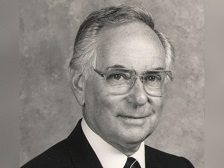
Lawrence (Larry) Rappaport
Professor of Plant Sciences, Emeritus
Lawrence (Larry) Rappaport, Emeritus Professor of Plant Sciences at the University of California, Davis, passed away peacefully at home on October 5, 2022 at the age of 94.
Rappaport was born on May 28, 1928, and grew up in the Bronx until the age of 13 when his family moved to Brooklyn, New York. In the 1930s both the Bronx and Brooklyn were agricultural communities, and he recalled looking out over farmland from his home. This inspired his interest and motivation to study Plant Pathology, which he initiated in the late 1940’s at the University of Idaho. During a break in his studies, Rappaport and a friend drove to California in their 1937 Chevy. When he saw the rich horticultural landscape in California, he knew that this was where he wanted to work and set his sights with tremendous focus and purpose in achieving that goal. After completing his B.S. and serving in the Korean War, Rappaport completed his Doctoral degree in Horticulture at Michigan State University.
In 1956, shortly after completing his Ph.D., Rappaport joined the Department of Vegetable Crops at UC Davis as a vegetable postharvest physiologist and was mentored by some of the leading researchers in the field, including Leonard Morris and Harlan Pratt. He and his wife, Norma, settled in Davis and raised three children here. In addition to his research in postharvest physiology, Rappaport was a pioneer in studying the plant growth hormone gibberellin, which he applied in studies of potato bud dormancy during storage. In addition to his Ph.D. work with Sylvan Wittwer at MSU, he spent time in the lab of Jake MacMillan in the United Kingdom and a sabbatical with Shinichiro Kawata in Japan, honing his skills in gibberellin chemistry and plant tissue culture. He noted in an emeritus video interview that, at that time, he was doing postharvest research during the day and hormone research at night.
In the 1970s, Rappaport conceived the notion that there would be value in having a small, interdisciplinary institute devoted to the developing field of plant biotechnology. After considerable internal politicking on campus, he was able to create the Plant Growth Laboratory in Wickson Hall on the UC Davis campus. Along with Rappaport, Bill Breidenbach, Ray Valentine and Ray Huffaker were among the members of this group, which explored plant cell culture and genetic modification techniques that laid the groundwork for plant genetic engineering.
Rappaport became the chair of the Vegetable Crops Department in 1979, and claimed to be one of the few faculty members to volunteer to serve as Department Chair. He took on a significant challenge in rebuilding the department just as a large cohort of faculty hired after World War II was retiring. In the early 1980s, he hired 10 new faculty members within a few years, renewing the department and expanding both basic and applied research in genetics, breeding, physiology and crop management. Rappaport had a keen recognition of the value of having a faculty with feet in both camps of basic and applied research, and this philosophy guided his administrative leadership. All who were hired by him or who served under his leadership appreciated his strong support, mentorship and sage advice.
At the same time, Rappaport also was director of a five-year international project in Egypt to increase the productivity of vegetables there, particularly tomatoes. Ron Voss and Bill Sims (Cooperative Extension specialists in the Vegetable Crops Department) led these programs in Egypt, which tripled tomato yields. In addition, Rappaport taught courses in plant growth and development during a period of increasing student interest in agriculture, when enrollments in his courses went from 20 to 30 students to more than 150.
Even among all his research, teaching and administrative responsibilities, Rappaport found time to be a key leader of the Jewish community in Davis. Recognizing a need for UCD Jewish students to have a place to gather, he brought them to meet in the family’s living room, leading to the creation of Hillel of Davis and Sacramento, a home-away-from-home for Jewish students. Norma and Larry were both among the founders of the Jewish Fellowship of Davis (Congregation Bet Haverim). He also was one of the founders of the Davis Human Relations Council, working to support tolerance and diversity locally.
Rappaport retired in 1991, but continued to secure grants and conduct research on hormonal regulation of plant growth and development for an additional six years with his colleague, Bruce Bonner.
As part of the OLLI Writers Group, Rappaport also became interested in writing his memoirs, which he eventually published. These delightful stories and memories, including descriptions of his sabbaticals with his family and adventures at scientific conferences, were ultimately a gift to himself and his family as his memory faded.
Larry Rappaport’s sweet, warm and spontaneous nature brought smiles to those around him to the very end. He lived his values of family and community, and his example and presence will continue to be felt in all that he helped build. He truly followed the advice he gave to his grandchildren in his memoirs: “Openness to others is a key to a loving and happy life.”
Rappaport is survived by his wife Norma, children Meryl, Debra (Kramer) and Craig, and five grandchildren.
Kent J. Bradford
Alan Bennett
